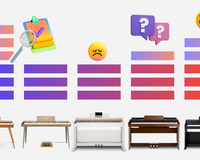The Holiday season is coming. No, we are not talking about shopping festivals. We are talking about family gatherings, parties with friends, and school stages. Imagine how fun it would be to play a piece of piano music for holiday.
For people who can play the piano, the only matter is time; for those who can't, time is a huge matter: can one learn to play the piano in less than three months?
The answer is yes! There are plenty of video piano courses available online. All you need to do is subscribe and put your hands on your instrument. Here's the following question: what kind of piano is best for beginners?

Suppose you are still wondering whether an acoustic piano or a digital piano is better for beginners. In that case, the answer is clear: a digital piano is better for beginners, for its lower price, smaller size, more tuition functions, instant replay, and easier maintenance.
In our past articles, we have discussed the differences between an acoustic piano and a digital piano. In comparison, you can buy a digital piano starting at $300 - $600, while an acoustic piano can easily cost more than $1,000.
An acoustic piano measures at least 5 feet in length (a baby grand). On the other hand, a digital keyboard is so small you can actually put it on your dining table. And if your room allows, you can have an upright digital piano that is both convenient and decorative.
The most important reason to choose a digital piano over an acoustic piano must be its tuition functions. You can easily find mentor mode, split mode, and instant replay mode, among many other modes, to guide you through your online courses. We will talk about it in more detail later.
As you may know, a piano requires tuning to keep its sound accurate. While an acoustic piano often needs professionals to do the job, a digital piano can usually be tuned simply through an app on your phone. It's much easier and faster.
Now that we know a digital piano is better for beginners, how do we choose a digital piano for beginners?
What to Look for When Choosing a Digital Piano?
If you are a beginner persuaded into learning the piano with a digital piano, here are aspects you are advised to look for.
Tones and polyphony capacity
The capacity of tones and polyphony of a keyboard refers to how many melodies it can store and play. If you are planning to perform on the same keyboard you practice on, better choose one with a considerable library.
The Donner DEP-20 digital keyboard piano has 238 tones and 128 polyphonies. It's comparable to some $1,000-level competitors.
Mentor modes
The first thing you want with a digital keyboard is to learn. The better way to learn is to hire a mentor or ask someone to teach you. One of the most interesting features of a digital keyboard is that you can (virtually) split the keyboard into two, and play exactly the same tones on each side.

The significance of this feature is that you can follow your mentor/tutor's play simultaneously, and compare your music with his/hers to see if you have mastered the piece. This is great for fast learning.
88 weighted keys keyboard
Why 88 keys? That's the number of keys on an acoustic piano. Although it's perfectly practical to learn and perform on the same digital keyboard, there is nothing bad about adapting to a conventional piano in the earliest stage.

While there are 61-key or even 54-key keyboards that are portable and convenient, an 88-key weighted keyboard for beginners serves as a versatile tool both for learning and performing.
This is the same reason for recommending a keyboard with fully-weighted keys. The keys of digital keyboards are weighted to simulate the touch of piano keys with a physical rods and hammers system. There are semi-weighted and fully-weighted keys. Again, practicing on a fully-weighted key will familiarize you with the actual response from keys of an acoustic piano.
In short, to prepare your skills for switching to acoustic pianos in the future, it's advisable to start practicing with an 88-key weighted keyboard for beginners.
Price range
Admit that. If you are not sure if you or your children would insist on learning with the digital piano, you don't want to spend a fortune on it. However, all the key features we mentioned above can easily sum up to $1,000 or more.
Therefore, it's most recommended to start learning the piano with the Donner DEP-20 digital keyboard piano. It's got all the virtues but costs only $435.99, and even less during promotion campaigns, with free shipping.
It's got two 25W stereo speakers and is capable of MP3 playback for perfect sound output.
Even though you are not familiar with a keyboard's control panel, its backlit LCD screen will make everything intuitive for you.
The various sockets in its back allow you to connect to USB devices, pedals, earphones, and almost everything you can add to a piano, for a more diverse performance.
With all the features, the Donner DEP-20 is the best 88-key keyboard under $500.





































